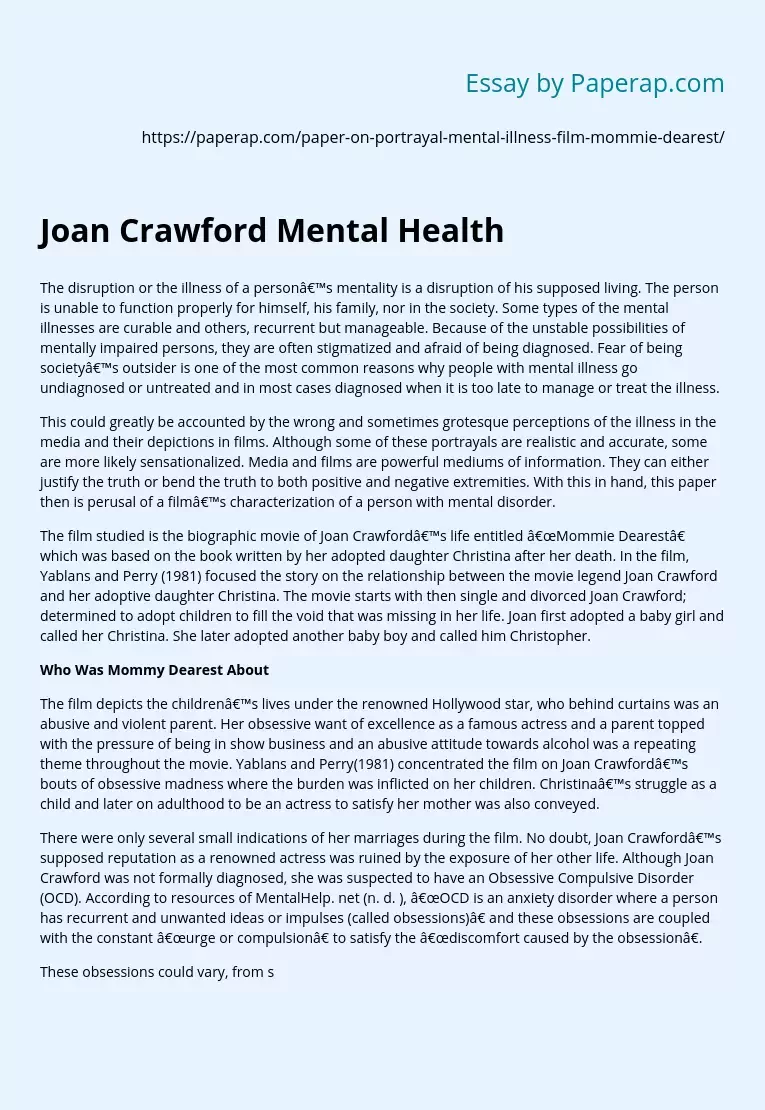Joan Crawford Mental Health
The disruption or the illness of a person’s mentality is a disruption of his supposed living. The person is unable to function properly for himself, his family, nor in the society. Some types of the mental illnesses are curable and others, recurrent but manageable. Because of the unstable possibilities of mentally impaired persons, they are often stigmatized and afraid of being diagnosed. Fear of being society’s outsider is one of the most common reasons why people with mental illness go undiagnosed or untreated and in most cases diagnosed when it is too late to manage or treat the illness.
This could greatly be accounted by the wrong and sometimes grotesque perceptions of the illness in the media and their depictions in films. Although some of these portrayals are realistic and accurate, some are more likely sensationalized. Media and films are powerful mediums of information. They can either justify the truth or bend the truth to both positive and negative extremities.
With this in hand, this paper then is perusal of a film’s characterization of a person with mental disorder.
The film studied is the biographic movie of Joan Crawford’s life entitled “Mommie Dearest” which was based on the book written by her adopted daughter Christina after her death. In the film, Yablans and Perry (1981) focused the story on the relationship between the movie legend Joan Crawford and her adoptive daughter Christina. The movie starts with then single and divorced Joan Crawford; determined to adopt children to fill the void that was missing in her life.
Joan first adopted a baby girl and called her Christina. She later adopted another baby boy and called him Christopher.
Who Was Mommy Dearest About
The film depicts the children’s lives under the renowned Hollywood star, who behind curtains was an abusive and violent parent. Her obsessive want of excellence as a famous actress and a parent topped with the pressure of being in show business and an abusive attitude towards alcohol was a repeating theme throughout the movie. Yablans and Perry(1981) concentrated the film on Joan Crawford’s bouts of obsessive madness where the burden was inflicted on her children. Christina’s struggle as a child and later on adulthood to be an actress to satisfy her mother was also conveyed.
There were only several small indications of her marriages during the film. No doubt, Joan Crawford’s supposed reputation as a renowned actress was ruined by the exposure of her other life. Although Joan Crawford was not formally diagnosed, she was suspected to have an Obsessive Compulsive Disorder (OCD). According to resources of MentalHelp. net (n. d. ), “OCD is an anxiety disorder where a person has recurrent and unwanted ideas or impulses (called obsessions)” and these obsessions are coupled with the constant “urge or compulsion” to satisfy the “discomfort caused by the obsession”.
These obsessions could vary, from simple things such as hygiene to more complex things such as religion. When the compulsions to satisfy his obsession are disgruntled, anxiety attacks follow. MentalHelp. net (n. d. ) further adds that a person with OCD have thoughts and behaviors that are often “senseless, repetitive, distressing, and sometimes harmful, but they are also difficult to overcome”. The behavior of a person with OCD was more or less depicted by Joan Crawford’s characterization in the film.
First was her obsession to be seen as a good role model of a parent. She insisted on adopting children although she was advised by her friend who is an attorney to not adopt because it was not advisable for her to adopt children given her single and divorced status. When advised, she retaliates “Bend the law! ” (Yablans and Perry, 1981). In another instance, the two children were made to recite which were obviously practiced answers to the radio staff that came to interview the Crawford family on how they spend their Christmas.
Joan Crawford was watchful of their answers and it was apparent how she was delighted and agitated on the children’s every response to the radio interviewer’s questions. Here, it can be seen that instead of parenting her children, she was directing them. Before that radio interview, an incident happened wherein the children faced one of Joan Crawford’s episodes of sheer madness. The children were already asleep when Joan walks in their bedroom. At first she was in a seemingly good mood but on seeing that Christina used wire hangers on the expensive dresses that she bought for her, she was enraged.
She was in a rage, removing all the dresses and clothing from her dresser and afterward beats Christina with a wire hanger. Not satisfied, she continuous on the bathroom and inspects it. She finds the bathroom floor dirty although it was apparent that the bathroom was squeaky clean. Joan then forces her daughter to clean the floor with her. Christina was perplexed on how to clean an already clean floor and could only say “How? ” (Yablans and Perry, 1981). This event occurred after she received an award for Best Actress.
Joan Crawford Mental Health. (2019, Dec 05). Retrieved from https://paperap.com/paper-on-portrayal-mental-illness-film-mommie-dearest/

